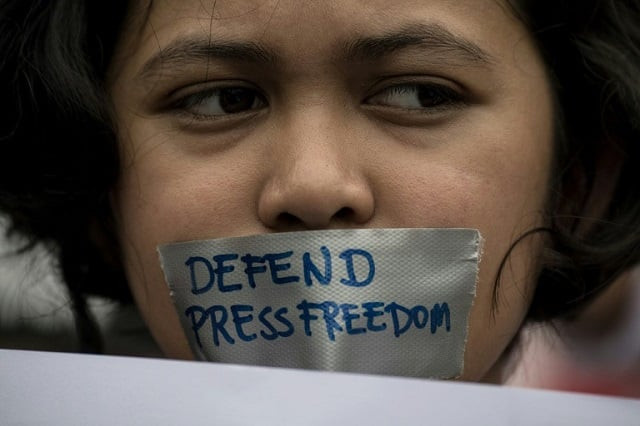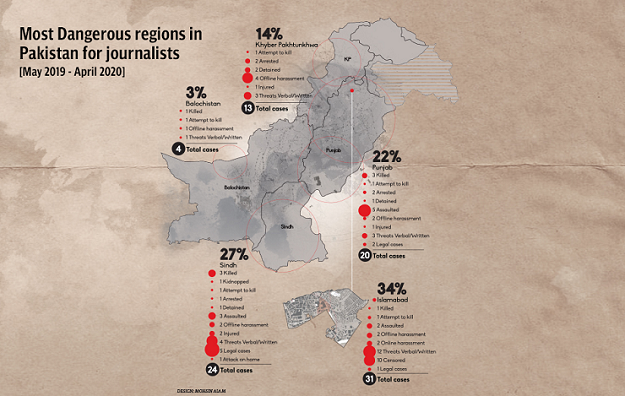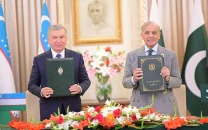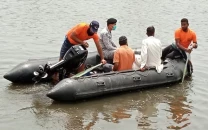Press freedom declining in Pakistan
Data collected by media rights watchdog says no place safe for journalists in the country

PHOTO: AFP/ File
The report, launched by the Freedom Network, titled 'Murders, harassment and assault: The tough wages of journalism in Pakistan', documents 91 assaults and other violations against journalists during the past 12 months. The long list of violations includes the killing of seven journalists, two abduction cases, nine detention cases, eight instances of frivolous lawsuits, 10 cases of censorship, 10 physical assaults, half of which caused severe bodily injuries, and more than 20 cases of written or verbal threats.
Data collected by the media rights watchdog shows that no place in the country, including the federal capital, is safe for media practitioners. Islamabad, the report said is the most dangerous place to practice journalism in Pakistan, with 31 out of the total 91 cases recorded in the federal capital. On the list of most dangerous places within the country, Sindh took the second spot with a total of 24 cases of violations against journalists, followed closely by Punjab with 20 cases, Khyber Pakhtunkhwa with 13, and Balochistan with three cases.
According to the report, the state and its functionaries emerged as the principal threat wielding the biggest stick to browbeat the media into submission. In a whopping 42% of the documented cases of violations against media workers, the victims or their families suspect the involvement of the state and its authorities.
"These actions have defaced the country's image abroad and has weakened the public's trust in democracy at home," said Executive Director, Freedom Network Iqbal Khattak. "Democracy cannot survive without pluralism and diversity. These actions by the current government violate the fundamental principles of democracy," Khattak added.
 PHOTO: Mohsin Alam
PHOTO: Mohsin AlamIn its report, the Freedom Network lists written threats of murder as the top violation against journalists, followed by verbal threats, offline and online harassment, and cases of assassination attempts of which seven resulted in killings.
In the long-run, these threats, force journalists to adopt to self-censorship.
"Enforced and self-censorship is increasing and taking deep-roots in Pakistani journalism, which is very dangerous," cautioned Khattak. "For a stronger Pakistan, we need a stronger media," said the media watchdog's executive director.
The government has actively denied any involvement with censoring the press. Speaking at the Washington-based United States Institute of Peace in July last year, Prime Minister Imran Khan, who has been criticised for ramping up censorship, denied accusations of curbing press freedom.
"The media in Pakistan is not just free, but sometimes out of control," the prime minister said, hinting that the country needed internal media regulation.
Journalists speaking on the condition of anonymity claimed that the relationship between the state and media has never been perfect, but media freedom, particularly, under Imran Khan, appears to be at its lowest, and censorship is felt stronger than ever before.
Independent assessment
Steven Butler, the Asia program director for the Committee to Protect Journalists, who was forced to leave the country last year said: "There is no doubt that press freedom is under assault in Pakistan."
"Journalists cannot work freely and do their job of supporting Pakistani democracy when they are under constant attack," cautioned Butler, who heads the Asia program at the New York-based journalist watchdog group.
Repeated attempts to control the free flow of information, Butler said, amounts to an assault on the constitutionally guaranteed right of the people to access information.
"Citizens need unfettered access to information that only a free press can provide. Actions of the state are impeding that access," he said.
Pakistan, according to international assessments, is considered a dangerous place for journalists. Intimidation, harassment, and assaults are commonly reported by media workers.
Butler praised the journalists for their talents and bravery. "They carry on under extremely difficult circumstances, so I cannot be pessimistic about the future of press freedom in Pakistan."
According to Zohra Yusuf, former chairperson of the Human Rights Commission of Pakistan, the country has slipped by three places on a global press freedom index to be ranked 145 out of 180 countries in the annual Reporters Without Borders analysis.
"Throughout the past two years and even in 2020 international organisations, working for press freedom, have expressed concern over the deteriorating state of media freedom in Pakistan," said Yusuf.
"From politically motivated cases against journalists to economic strangleholds, several strategies are being used to threaten freedom of the press," she added.
Saroop Ijaz, country representative Human Rights Watch (HRW), a New York-based advocacy group that closely monitors human rights violations all over the world, blamed the government for stifling free expression and journalism.
"There is still outright intimidation and harassment but there are also more sophisticated modes of censoring voices," said Ijaz.
Dissenting journalists, he said, are forced to go off-air. Besides that, he said: "There is a concerted effort to impeach the credibility of all journalism similar to what we see from other populist, authoritarian governments in the region and around the world," said the HRW representative.
The state, as mentioned in the annual report by the Freedom Network, Ijaz said, has displayed active hostility toward the existence of an independent, vibrant media.
He blamed the government for being 'incredibly shortsighted. "It will soon regret the assault on the media," he warned.
"Pakistan needs a vibrant and independent media to truly become a modern, progressive, democracy," the HRW representative said.



















COMMENTS
Comments are moderated and generally will be posted if they are on-topic and not abusive.
For more information, please see our Comments FAQ